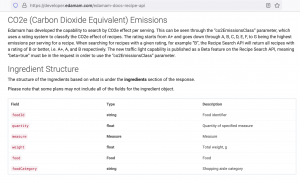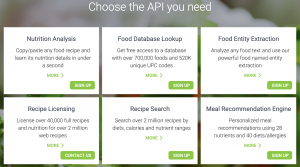Edamam and City, University of London collaborate to rank recipes and meals based on their CO2 impact

The CO2 labels of meals and recipes will help consumers, restaurants, and food delivery companies make climate consciousness driven food choices.
City, University of London's greenhouse gas emissions database is built on peer reviewed Life Cycle Analysis data. It features over 4500 individual food products.
The leading nutrition data API provider.
The collaboration introduces a traffic light system to rank and find recipes based on their CO2 imprint.
Adding CO2 labels is a timely and very much needed decision point for the climate conscious consumer.”— Victor Penev
NEW YORK, NY, USA, November 5, 2021 /EINPresswire.com/ -- Edamam, a provider of food and nutrition data to businesses, is releasing today in collaboration with the Research and Enterprise Department and Dr. Christian Reynolds at City, University of London a novel method to evaluate, classify and find recipes and meals based on their CO2 impact.
A major barrier to the adoption of low carbon lifestyles is the lack of consumer knowledge about greenhouse gas emissions (GHGE) at the level of recipe and/or portion. Until now, most publicly accessible data is listed per 100g of ingredient, but people don't just eat single ingredients, they eat meals.
The data license and partnership between Edamam and City, University of London aims to address this problem by providing carbon labels (from A+ to G) for over 70,000 of the most commonly eaten meals, and most recipes on the English language Internet.
The newly launched label ranking solution and corresponding recipe search functionality are available to businesses that want to use or build on top of this data via Edamam’s Recipe Search API. In the future, the carbon labeling will be provided as a real-time calculation of the carbon footprint of any recipe or meal on Edamam’s Nutrition Analysis API to businesses such as restaurants, catering companies, recipe developers, and food delivery companies.
“From our research just providing greenhouse gas emissions is not enough. You need to provide the context of carbon labels to people,” explained Dr. Christian Reynolds, the primary researcher on carbon footprint data at the Centre for Food Policy, City, University of London. “Edamam's Generic Meals database and technology is unique, so it is great to be working with such a trusted tech company,” added Dr. Reynolds
Edamam has labeled about 5 million recipes in the English language web with CO2 labels ranking from A+ (best) to G (worst) and is making those searchable via its Recipe Search API.
“We have always strived to empower people’s food choices with the power of data. Adding CO2 labels is a timely and very much needed decision point for the climate conscious consumer,” commented Victor Penev, Edamam’s CEO and founder.
Businesses interested in CO2 data and calculations are encouraged to visit Edamam’s Developer Portal and submit an inquiry.
City, University of London's greenhouse gas emissions database is built on peer reviewed Life Cycle Analysis data. It features over 4500 individual food products. For each food, the database provides confidence intervals to communicate the complexity of producing each item under multiple production methods, anywhere on the planet.
About Edamam
Edamam organizes the world’s food knowledge and provides nutrition data services and value-added solutions to health, wellness, and food businesses. Using a proprietary semantic technology platform, it delivers real-time nutrition analysis and diet recommendations via APIs. Edamam’s technology helps customers to answer their clients’ perennial question: “What should I eat?”
Edamam’s partners and clients include Nestle, Amazon, Microsoft, The Food Network, The New York Times, and Barilla.
For more information, please visit www.edamam.com or developer.edamam.com.
About the Centre for Food Policy at City, University of London
The Centre for Food Policy is an interdisciplinary centre dedicated to improving food policy worldwide. The Centre for Food Policy is one of the very few places in the world dedicated to exploring how the food system really works in practice and what policies are needed to make it work effectively. We use these insights to educate, influence and inform effective, joined-up policy. For more information, please visit: https://www.city.ac.uk/research/centres/food-policy
Dr Christian Reynolds, Senior Lecturer, Centre for Food Policy, City, University of London can be contacted at: christian.reynolds@city.ac.uk
Tia Khan, IP & Commercialisation Consultant Research & Enterprise, City, University of Londoncan be contacted for further information for license or collaboration enquiries relating to Carbon data research at t.khan@city.ac.uk
Victor Penev
Edamam
+1 646-378-8317
email us here
Visit us on social media:
Facebook
Twitter
LinkedIn
Other
You just read:
News Provided By
November 05, 2021, 14:45 GMT
Share This Article
EIN Presswire's priority is source transparency. We do not allow opaque clients, and our editors try to be careful about weeding out false and misleading content. As a user, if you see something we have missed, please do bring it to our attention. Your help is welcome. EIN Presswire, Everyone's Internet News Presswire™, tries to define some of the boundaries that are reasonable in today's world. Please see our Editorial Guidelines for more information.



![]()
